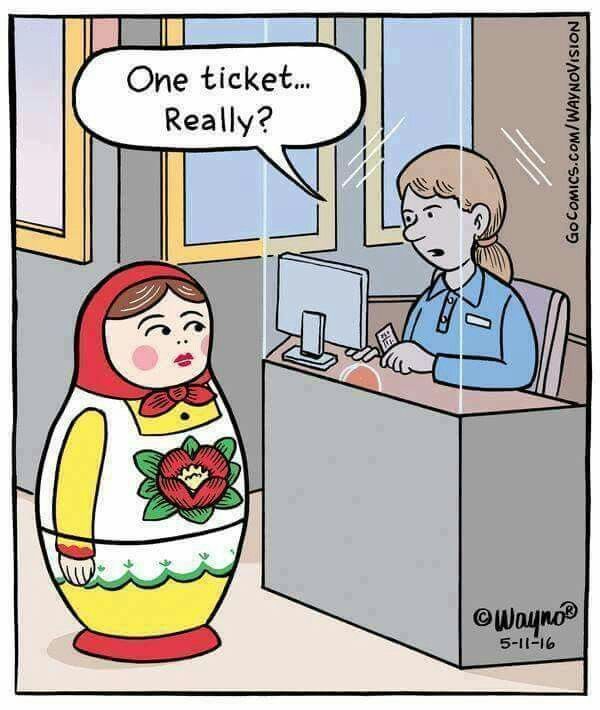
“A-players hire people even better than themselves. It’s clear, though, that B-players hire C-players so they can feel superior to them, and C-players hire D-players. If you start hiring B-players, expect what Steve Jobs called ‘the bozo explosion’ to happen in your organization. Start hiring B-players and you end up with Z-players.” – Guy Kawasaki, former chief evangelist at Apple
A favorite toy among Russian children, the matryoshka doll is a series of wooden dolls that nest inside each other and get progressively smaller and smaller. Open up the largest doll and you’ll find a smaller, identical doll. Open up that doll and there is yet a smaller one. There may be as many as 15 dolls inside the largest one.
I’ll use the matryoshka doll as an analogy for how insecure or uninformed leaders can inhibit the growth and health of their organization by choosing weak team members and how good leaders do the opposite.
Recruit people who are “bigger” than you.
If the person at the top of the organization intentionally hires someone who is “smaller” (less qualified with less potential; I’m still using the matryoshka doll illustration), and that person recruits someone who is “smaller” than herself and this selection criterion continues to cascade down through the entire organization, eventually it will produce a dumbed-down organization.
Instead, recruit people who are wiser, more capable, and more informed than you, and insist that your direct reports follow suit.
Recruit people who are different than you.
Except for their size, all of the dolls inside a matryoshka doll are identical. The implication for leaders is: if you only recruit team members who are similar to you—in personality, gifts, age range, perspective—your team will not benefit from the critical element of diversity.
Instead, mix it up. Compile a diverse team and then don’t squelch their individuality but embrace and encourage their differences.
Choosing quality team members is the leader’s most important job.
Leaders make two types of major decisions: strategy and people. The people decisions are the most important because if you get the right people on your team, they will help set the right strategy. The success of your organization will rise and fall on the quality of your team.
When I was a kid, we often played an impromptu game of softball or basketball after school. Everyone who wanted to play gathered, two captains were chosen, a coin toss determined which captain chose first, and then teammates were selected one at a time. The captain who chose the best players, won. Sometimes a captain would choose a less-skilled player early in the selection process so as not to hurt the person’s feelings (no one wanted to be chosen last). While that might have been the kind thing to do, it wasn’t the smart thing to do if you wanted to win.
Leaders, choose the best and the brightest to serve on your team and your organization will prosper.
This suggestion is not for the insecure and paranoid; it takes a lot of emotional fortitude and self-confidence to recruit and empower people who are smarter, more competent, edgier, and more connected than you. But if you don’t, you and your organization will suffer from the diminishing-expertise syndrome.
You may wonder, “Won’t that make me look bad?” No, it makes you a competent leader. Remember, leaders get work done through other people, so having an A-team will produce top results. Also, surrounding yourself with top-flight people will motivate you to continue to grow and become better; it will keep you sharp and accountable.
In her book Team of Rivals, Doris Goodwin reminds us that when Abraham Lincoln was elected president and began compiling his cabinet, he chose strong and competent men. Some of them had run against him in the primaries, men who had hoped to have his job—essentially, he chose a cabinet of opponents. Lincoln reasoned, “I have looked the party over and concluded that these men were the very strongest men. I had no right to deprive the country of their services.”
Business consultant Warren Bennis says, “Great teams are led by people confident enough to recruit people better than themselves.”
Surround yourself with great people.

My son was hired for a management job after taking various tests, including an IQ test. The person who hired him said he was looking for someone with a higher IQ than his, along with other traits.
I was impressed with his boss.
Irene, I was delighted to read your last sentence. I thought your response was heading in the opposite direction.
Great piece, Donn. In my opinion, identifying, recruiting, and hiring talented people is the most important skill of a leader. The second most important skill is empowering and supporting those leaders, followed by investing in their leadership capacities through professional development opportunities. Assembling a first-class team results in a first-class organization.
Bill, I agree; the success of an organization will rise and fall on the quality of team members.
Sometimes those in management want a “cheap” solution and think that a less capable person will be sufficient. As COVID-19 proves, every organisation faces challenges from time to time and it needs staff who can adapt and innovate. If you only employ people who can carry-out a process day after day they will have little job satisfaction and will not invest their energy in the company. Better not to employ at all than employ a mediocre candidate.
Well said, Angela. I once read that Bill Gates said that an A+ programmer is 10 times better than a B level programmer, so he always hired the best.